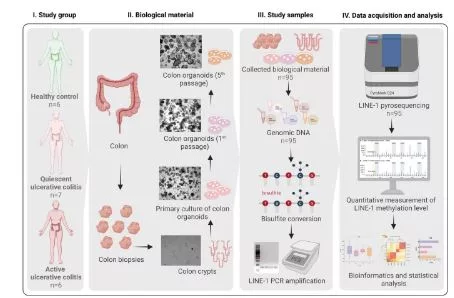This study investigates the impact of long-term culturing on the global genomic methylation levels in colonic epithelial organoids derived from healthy individuals and patients with active or quiescent ulcerative colitis (UC). The researchers focused on evaluating the epigenetic stability of these organoids by assessing the methylation level of LINE-1 during prolonged culturing. The study found that the LINE-1 region in both healthy and UC patient colon tissues, as well as their corresponding epithelial organoids, is highly methylated (exceeding 60%). However, long-term culturing resulted in a decrease in LINE-1 methylation levels (up to 8%) compared to tissue of origin and short-term cultures. Additionally, the study revealed that the pace of LINE-1 methylation level decrease in sub-cultured organoids varies depending on the patient diagnosis (healthy control, active or quiescent UC). The researchers propose LINE-1 as a potential biomarker for reliably assessing the global methylation status of patient-derived intestinal epithelial organoids in routine testing of ex vivo cultures.
Keywords: Organoids, ulcerative colitis




